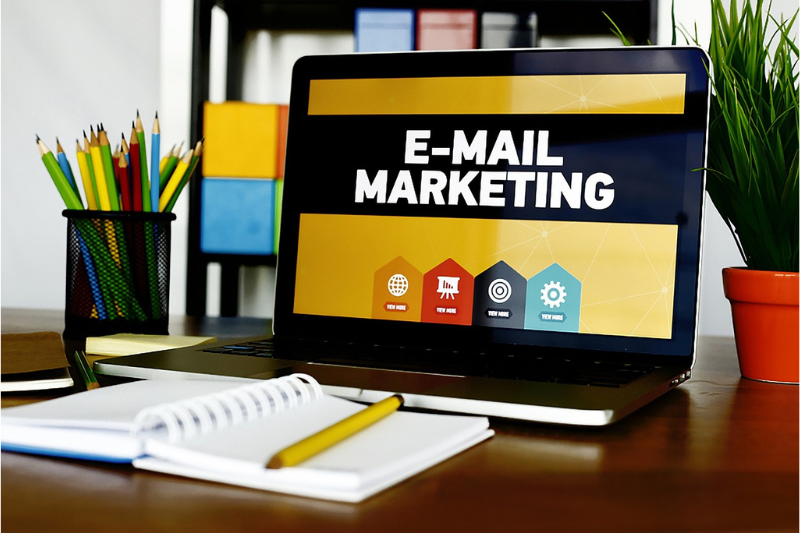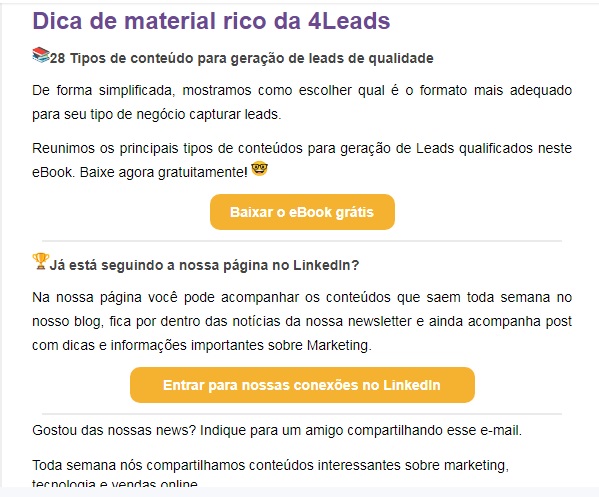
Email marketing for B2B is an efficient way to nurture leads, maintain closer communication, and convert a lead into a customer.
"A business that doesn't invest in email marketing is a business that's leaving money on the table, not leveraging the full communication and relationship potential with a warm base of people who are already its customers." - Fabrício Coimbra, Head of 4Leads.
Imagine that you prepare quality content (ebook, infographic, webinar), create a landing page, and get some conversions but end up with a dormant list of contacts. That makes no sense!
You need to set up an email flow so these leads can develop an interest in your product or service and take action, whether speaking with a consultant or making a purchase. But it doesn't stop there.
This lead must be nurtured, that is, to continue receiving relevant emails. You can offer other valuable content, news about the company's niche, blog articles addressing doubts, exclusive offers, discount coupons, and more.
Although some may believe that email marketing is ineffective, data from the Content Marketing Institute shows that 87% of B2B marketers use email as a distribution channel. This information highlights that managers who disregard emails miss out on sales opportunities.
Now that you have a general idea about the significance of email marketing for B2B get ready to delve deep into the topic!
We've prepared this article for you to better understand:
Keep reading and clear all your doubts on the subject.
Creating an email marketing campaign means developing and implementing communication strategies by sending targeted and personalized emails to a specific audience.
These strategies involve crafting relevant and persuasive content, segmenting the contact list, designing appealing emails, and monitoring the results.
The goal is to engage the recipients, promote products or services, build lasting relationships, and ultimately achieve the company's marketing objectives, such as boosting sales, generating qualified leads, or strengthening the brand.
By segmenting your contact list based on criteria such as interests, purchasing behavior, and geographic location, among others, you can send more relevant and personalized messages to each specific group. Doing so increases the likelihood of engagement and conversion because your recipients will feel more connected and catered to.
Moreover, personalization can also extend to include the recipient's name and other specific information in each email, providing a more personalized experience.
An email design optimized for conversion is vital to capture the recipient's attention and encourage the desired action.
Therefore, emails should have a clean and appealing layout with a clear information hierarchy. Visual elements, such as relevant images and call-to-action buttons (CTAs), steer the recipient's focus toward the most important information and encourage interaction.
Additionally, the design must be responsive, ensuring that emails are displayed correctly on mobile devices, given the growing number of people accessing emails via smartphones and tablets.
It's also essential to test the emails before sending them to ensure they display correctly.
Below, you'll find an example from a section of our newsletter showcasing the use of conversion buttons.

Content is one of the most critical parts of B2B email marketing. It must be persuasive, engaging users and prompting them to act. Here's how this can be achieved!
When crafting B2B email campaigns for conversion, delivering personalized and targeted messages is essential. This involves understanding the target audience's needs, challenges, and interests and tailoring the company's message accordingly.
A crucial factor is also segmenting the contact list based on relevant criteria. This allows sending specific messages to each segment, addressing pain points, and offering tailored solutions.
Furthermore, using personalization techniques, such as including the recipient's name and making specific references to their business, establishes a stronger connection, increasing the likelihood of engagement and conversion.
Below is an example of a personalized email featuring the user's name who is receiving it.
When crafting B2B email campaigns for conversion, it's essential to highlight the value-added offers and clear benefits your product or service provides.
It's essential to demonstrate how your brand's solution can address specific challenges faced by the target audience and the tangible benefits they can expect when choosing your company.
This might include exclusive features, quality guarantees, specialized technical support, cost reduction, efficiency enhancement, and more. All presented clearly and explicitly.
The sales funnel represents the process of converting a lead into a customer, moving through various stages from awareness to the purchasing decision. By optimizing the sales funnel, you can tailor email flows to each funnel stage, making it more efficient to turn leads into genuine customers.
For instance, at the funnel's top, where leads are in the awareness phase, it's ideal to send educational and informative emails to capture their attention and interest.
In the funnel's middle, where leads are considering their options, sending emails with more in-depth content, product demonstrations, or case studies is preferable to help them make an informed decision.
At the funnel's bottom, where leads are ready to purchase, emails with special offers, testimonials from satisfied clients, and incentives to finalize the purchase are sent out.
By creating automated email sequences, you can provide relevant and personalized content to leads at various funnel stages. This level of customization aims to educate the leads, deliver vital information, overcome objections, and steering them toward conversion.
At 4Leads, we employ marketing automation tools to set up customized email flows based on specific lead actions, such as content downloads, site visits, or previous interactions.
Thus, email automation facilitates a consistent relationship with the leads, nurturing them over time and boosting conversion chances.
This strategic and personalized follow-up involves closely monitoring the lead's progress at each funnel stage and adjusting the approaches accordingly.
Tools like CRM (Customer Relationship Management) can be employed to record all interactions with the leads, from sent emails to phone calls and scheduled meetings.
This way, you can maintain a comprehensive lead interaction history and customize interactions based on this data.
Furthermore, tracking relevant metrics like email open rates, click-through rates, and conversion rates is crucial to pinpoint improvement opportunities and implement strategic actions.
A personalized follow-up shows genuine interest in the lead, assists in building robust relationships, and enhances the likelihood of business closure.
See how it's possible to transform leads into clients without excessive effort and juggling? All you need is to effectively, uniquely, and strategically approach the B2B audience through email marketing.
By applying the necessary techniques and methodologies, results are quickly noticed. You can rely on our team to boost conversions and attain those much-coveted clients!
We study the persona and the company to understand how strategic planning should be executed. We craft valuable content tailored to the persona's stage.
Our highly skilled team is poised to deliver the desired results and meet set targets. Talk to one of our consultants to understand our methodology and how your management can benefit from it!
Find us on LinkedIn for amazing content on digital marketing and technology!